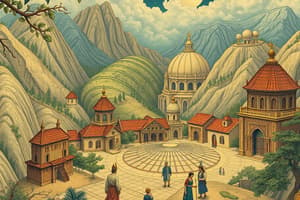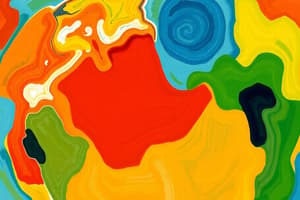Podcast
Questions and Answers
What does physical geography primarily study?
What does physical geography primarily study?
- Technological tools for mapping
- Human activities in urban areas
- Cultural landscapes and dynamics
- Natural features and processes of the Earth (correct)
Which branch of geography deals with the relationship between human activities and the environment?
Which branch of geography deals with the relationship between human activities and the environment?
- Geospatial Technologies
- Physical Geography
- Environmental Science
- Human Geography (correct)
What is the purpose of geospatial technologies in geography?
What is the purpose of geospatial technologies in geography?
- To analyze and map spatial data (correct)
- To study human population dynamics
- To create political maps only
- To define regions based on cultures
What term describes the specific coordinates of a location?
What term describes the specific coordinates of a location?
Which of the following is a major issue affecting geography currently?
Which of the following is a major issue affecting geography currently?
What is one of the major oceans on Earth?
What is one of the major oceans on Earth?
What does the term 'region' in geography refer to?
What does the term 'region' in geography refer to?
Which organization coordinates global geospatial data for humanitarian purposes?
Which organization coordinates global geospatial data for humanitarian purposes?
Flashcards are hidden until you start studying
Study Notes
Definition
- Geography is the study of places, the relationships between people and their environments, and the physical and human characteristics of the Earth's surface.
Branches of Geography
-
Physical Geography
- Focuses on natural features: landforms, climate, vegetation, and ecosystems.
- Studies processes such as erosion, weather patterns, and natural disasters.
-
Human Geography
- Examines human activities and their relationship with the environment.
- Covers topics like urban development, cultural landscapes, and population dynamics.
-
Geospatial Technologies
- Involves tools and techniques for mapping and analyzing spatial data.
- Includes GIS (Geographic Information Systems), remote sensing, and GPS technology.
Important Concepts
-
Location
- Absolute Location: Specific coordinates (latitude and longitude).
- Relative Location: Position in relation to other places.
-
Place
- Characteristics that make a location unique (cultural, physical, historical).
-
Region
- Areas defined by common features: physical (landforms, climate) or human (cultural, economic).
-
Movement
- How and why people, goods, and ideas move from one place to another.
-
Human-Environment Interaction
- Examines how humans adapt to and modify their environment.
Tools of Geography
-
Maps
- Various types: political, physical, thematic, and topographic.
- Essential for spatial analysis and navigation.
-
Globes
- Three-dimensional representation of Earth, providing accurate geographical context.
-
Cartography
- The art and science of map-making, emphasizing accuracy and aesthetics.
Major Geographic Features
-
Continents
- Seven major continents: Africa, Antarctica, Asia, Europe, North America, Australia (Oceania), South America.
-
Oceans
- Five major oceans: Pacific, Atlantic, Indian, Southern (Antarctic), Arctic.
-
Landforms
- Mountains, valleys, plains, plateaus, deserts, and wetlands.
Current Geographic Issues
-
Climate Change
- Impact on weather patterns, sea levels, and biodiversity.
-
Urbanization
- Growth of cities and its effects on society and the environment.
-
Globalization
- Increasing interconnectedness of economies and cultures impacting local geographies.
Geographic Organizations
-
United Nations Geospatial Information Section
- Coordinates global geospatial data to support humanitarian efforts.
-
National Geographic Society
- Focuses on education and inspiration regarding geography and exploration.
Definition
- Geography studies the interplay between places, people, and their environments, analyzing both physical and human characteristics of the Earth's surface.
Branches of Geography
- Physical Geography
- Investigates natural features such as landforms, climate, vegetation, and ecosystems.
- Analyzes natural processes, including erosion, weather patterns, and natural disasters.
- Human Geography
- Explores human activities and their environmental interactions.
- Topics include urban development, cultural landscapes, and population dynamics.
- Geospatial Technologies
- Utilizes tools for mapping and spatial data analysis, enhancing geographic understanding.
- Major components include Geographic Information Systems (GIS), remote sensing, and GPS technology.
Important Concepts
- Location
- Absolute Location: Specific coordinates defined by latitude and longitude.
- Relative Location: Describes a location's position in relation to other places.
- Place
- Encompasses unique characteristics of a location, including cultural, physical, and historical elements.
- Region
- Defined by common physical (landforms, climate) or human (cultural, economic) features.
- Movement
- Studies the dynamics of how and why people, goods, and ideas move across locations.
- Human-Environment Interaction
- Examines how humans adapt to and modify their environments, reflecting their impact on nature.
Tools of Geography
- Maps
- Various types include political, physical, thematic, and topographic.
- Essential for spatial analysis, navigation, and understanding geographic relationships.
- Globes
- Provide a three-dimensional representation of Earth, enhancing spatial awareness and context.
- Cartography
- Focuses on the science and art of map-making with importance placed on accuracy and visual appeal.
Major Geographic Features
- Continents
- Recognized seven major continents: Africa, Antarctica, Asia, Europe, North America, Australia (Oceania), and South America.
- Oceans
- Comprising five major oceans: Pacific, Atlantic, Indian, Southern (Antarctic), and Arctic.
- Landforms
- Includes diverse features like mountains, valleys, plains, plateaus, deserts, and wetlands.
Current Geographic Issues
- Climate Change
- Alters weather patterns, affects sea levels, and threatens biodiversity across the globe.
- Urbanization
- Reflects the rapid growth of cities and impacts on societal structures and environments.
- Globalization
- Increases interconnectivity of economies and cultures, influencing local geographies and practices.
Geographic Organizations
- United Nations Geospatial Information Section
- Coordinates worldwide geospatial data to assist humanitarian initiatives and interventions.
- National Geographic Society
- Dedicated to education and inspiration in geography, exploration, and environmental conservation.
Studying That Suits You
Use AI to generate personalized quizzes and flashcards to suit your learning preferences.




